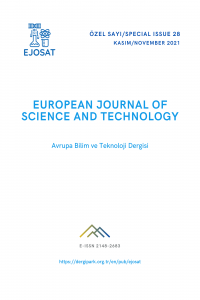Bir Mobilya İşletmesinde Kurumsal Kaynak Planlaması için İş Etüdü-Verimlilik Uygulamasının Analizi: Örnek Olay
Öz
İş etüdü; var olan işin ne şekilde gerçekleştirildiğini, yeni sermaye ihtiyacı olmadan veya düşük miktarda sermaye ile ne şekilde gerçekleştirileceğini belirlemek, işgücü ve gereç imkânlarının en iktisadi ve en uygun şekilde kullanılarak üretim rantabilitesini artırmak amacıyla yapılmaktadır. Bu çalışmada, iş etüdü teknikleri kullanılarak bir işletmede verimlilik çalışması ele alınmıştır. Çalışmada iş etüdü tekniklerine ve bu tekniklerin işletmede üretilen üç farklı ürün tipinde uygulama çalışması anlatılmıştır.
İş etüdü teknikleri sırasında iş (faaliyet) sistemleri incelenmiştir. Metod etüdü tekniği ile iş sisteminin öğeleriyle ilgili eksiklikler ve aksaklıklar tanımlanmış olup, gözlem sonucunda elde edilen sonuçlar değerlendirilmiştir. Zaman etüdü tekniğiyle ise gözlem sonucu ile elde edilen temel zaman verilerinden zaman standartları bulunmuştur. Gözlem sonucu işletme de planlama ve programlama eksikliğinden doğan aksaklıklar, uygun olmayan çevre koşulları, ergonomik önlemlerin yetersizliği gibi problemlerle karşılaşılmıştır. Metod etüdü sonucunda, çalışma koşularının iyileştirilmesi için çeşitli önerilerde bulunulmuştur. Zaman etüdü sonucunda ise planlama ve kontrol eksikliğinin giderilebilmesi için yeni veriler elde edilmiştir. Ayrıca çevre koşullarıyla ilgili iyileştirmelerin iş görenlerdeki yorgunluk seviyesini düşürerek standart zamanların düşürülmesiyle zaman tasarrufu yapılabileceği belirlenmiştir. Bu çalışma ile elde edilen bulgular sonucunda, verimliliğin sağlanması için iş etüdü tekniklerinden faydalanmaları işletmeye önerilmiştir. Bu çalışmanın bir diğer amacı ise iş etüdü-verimlilik uygulaması analizi ile elde edilen veriler yardımıyla işletmenin Kurumsal Kaynak Planlaması yazılımının ihtiyaç duyacağı verileri elde etmektir. Çalışmada bu gerçek hayat iş etüdü verimlilik analizi uygulaması sonucunda elde edilen bulgular sunulmuştur.
Anahtar Kelimeler
Üretim Yönetimi Verimlilik İş etüdü Kurumsal Kaynak Planlaması Örnek Olay
Kaynakça
- Şahin, E., (2003). Bir İşyerindeki Metot ve Zaman Etüdü ile Verimliliğin Belirlenmesi. Teknoloji Dergisi, 3-4, 59-66.
- Üçüncü, K., (2005). Ergonomi ve İş Etüdü, Orman Fakültesi, Orman Endüstri Mühendisliği Bölümü Ders Notları, No:77, K.T.Ü. Basımevi, Trabzon.
- Doğruer, İ., (2014). İş Etüdü. 2. Baskı, Açılım kitap, İstanbul.
- Karayalçın, İ., (1977). Fabrika Organizasyonu, Çağlayan Kitapevi, İstanbul.
- Kanawaty, G., (2004). İş Etüdü. (çev. Zühal Akal). Ankara: Mpm Yayımları no:29.
- Haftacı, V,. (1995). Verimlilik Çözümlemeleri, KOÜ Yayınları, İzmit.
Analysis of Work-Study-Productivity Practice for Enterprise Resource Planning in a Furniture Firm: Case Study
Öz
Work-study; it is done to determine how the existing work is done, how it can be done without requiring new investment or with very little investment, and to increase production efficiency by using human and material resources most economically and efficiently. In this study, productivity study in a business is discussed by using work-study techniques. In the study, work-study techniques and the application of these techniques in three different product types produced in the enterprise are explained.
During work-study techniques, work systems are examined. With the method study technique, the deficiencies and problems related to the elements of the business system were defined and the results ensured as an outcome of the observation were evaluated. With the time study technique, time standards were found from the basic time data ensured as an outcome of observation. As a result of the observation, problems such as disruptions arising from the lack of planning and programming in the enterprise, unsuitable environmental conditions, the inadequacy of ergonomic measures were encountered. As a result of the method study, various suggestions were made for the improvement of the working conditions. As a result of the time study, new data were obtained to eliminate the lack of planning and control. In addition, it has been determined that improvements in environmental conditions can reduce the fatigue level of workers and save time by reducing standard times. As a result of the findings obtained with this study, it is suggested to the business to benefit from work-study techniques to ensure efficiency. Another aim of this work is to obtain the data that the Enterprise Resource Planning software of the enterprise will need with the help of the data obtained by the work study-productivity application analysis. In the study, the findings obtained as a result of this real-life work-study productivity analysis application are presented.
Anahtar Kelimeler
Production management Productivity Work-study Enterprise Resource Planning Case Study
Kaynakça
- Şahin, E., (2003). Bir İşyerindeki Metot ve Zaman Etüdü ile Verimliliğin Belirlenmesi. Teknoloji Dergisi, 3-4, 59-66.
- Üçüncü, K., (2005). Ergonomi ve İş Etüdü, Orman Fakültesi, Orman Endüstri Mühendisliği Bölümü Ders Notları, No:77, K.T.Ü. Basımevi, Trabzon.
- Doğruer, İ., (2014). İş Etüdü. 2. Baskı, Açılım kitap, İstanbul.
- Karayalçın, İ., (1977). Fabrika Organizasyonu, Çağlayan Kitapevi, İstanbul.
- Kanawaty, G., (2004). İş Etüdü. (çev. Zühal Akal). Ankara: Mpm Yayımları no:29.
- Haftacı, V,. (1995). Verimlilik Çözümlemeleri, KOÜ Yayınları, İzmit.
Ayrıntılar
| Birincil Dil | Türkçe |
|---|---|
| Konular | Mühendislik |
| Bölüm | Makaleler |
| Yazarlar | |
| Yayımlanma Tarihi | 30 Kasım 2021 |
| Yayımlandığı Sayı | Yıl 2021 Sayı: 28 |


